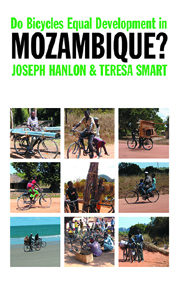Book contents
- Frontmatter
- Contents
- Acknowledgements
- The authors
- Money & measurements
- Abbreviations, acronyms & glossary
- Part I IS THERE DEVELOPMENT IN MOZAMBIQUE?
- Part II ACTORS & CONTEXT
- Part III ALTERNATIVES & THE DEVELOPMENTAL STATE
- 13 Questioning the cargo cult
- 14 Increase demand to kick-start the economy
- 15 Agriculture & the new role for the state
- 16 Finance & a development bank
- 17 The developmental state builds capitalism
- 18 Can Mozambique stop putting its hand out & become a development state?
- Appendix 1 Aid
- Appendix 2 Investment & other tables
- Bibliography
- Index
15 - Agriculture & the new role for the state
from Part III - ALTERNATIVES & THE DEVELOPMENTAL STATE
Published online by Cambridge University Press: 05 April 2013
- Frontmatter
- Contents
- Acknowledgements
- The authors
- Money & measurements
- Abbreviations, acronyms & glossary
- Part I IS THERE DEVELOPMENT IN MOZAMBIQUE?
- Part II ACTORS & CONTEXT
- Part III ALTERNATIVES & THE DEVELOPMENTAL STATE
- 13 Questioning the cargo cult
- 14 Increase demand to kick-start the economy
- 15 Agriculture & the new role for the state
- 16 Finance & a development bank
- 17 The developmental state builds capitalism
- 18 Can Mozambique stop putting its hand out & become a development state?
- Appendix 1 Aid
- Appendix 2 Investment & other tables
- Bibliography
- Index
Summary
Agriculture is the base of our economy, satisfying the basic food needs of the people, supplying raw materials for industry, and guaranteeing a level of exports necessary for the economic development of the country. … Agriculture, creating the largest part of our surplus, is the main source of accumulation for our development
(Frelimo 3rd Congress, 3–7 Feb. 1977).The agricultural economy contributes directly to reducing poverty in Mozambique. Most poor people live in rural areas
(PARPA II, 2 May 2006, para 231).Agricultural growth is the main determinant in reducing rural poverty.
(World Bank 2006a: 23).For three decades, the centrality of agriculture to Mozambican development has been recognised. Agriculture still supports 80% of the Mozambican population (World Bank 2005a: xiii).There was growth in production after the end of the war, but it came largely through displaced people returning home and re-opening land that had not been used for many years. The World Bank (2006a) warns that such growth is not sustainable because there has been no modernisation; more than 30 years after independence, most peasants farm in the same way as their grandparents.
Of Mozambican farm families, 99.6% have small holdings averaging only 1.2 ha, because with only a hoe they cannot work more land. Of the rest, 0.33% are medium-sized farmers with 6.6 ha and a tiny 0.07% are large farmers with an average 282 ha (Mole 2006).
- Type
- Chapter
- Information
- Do Bicycles Equal Development in Mozambique? , pp. 161 - 174Publisher: Boydell & BrewerPrint publication year: 2008



